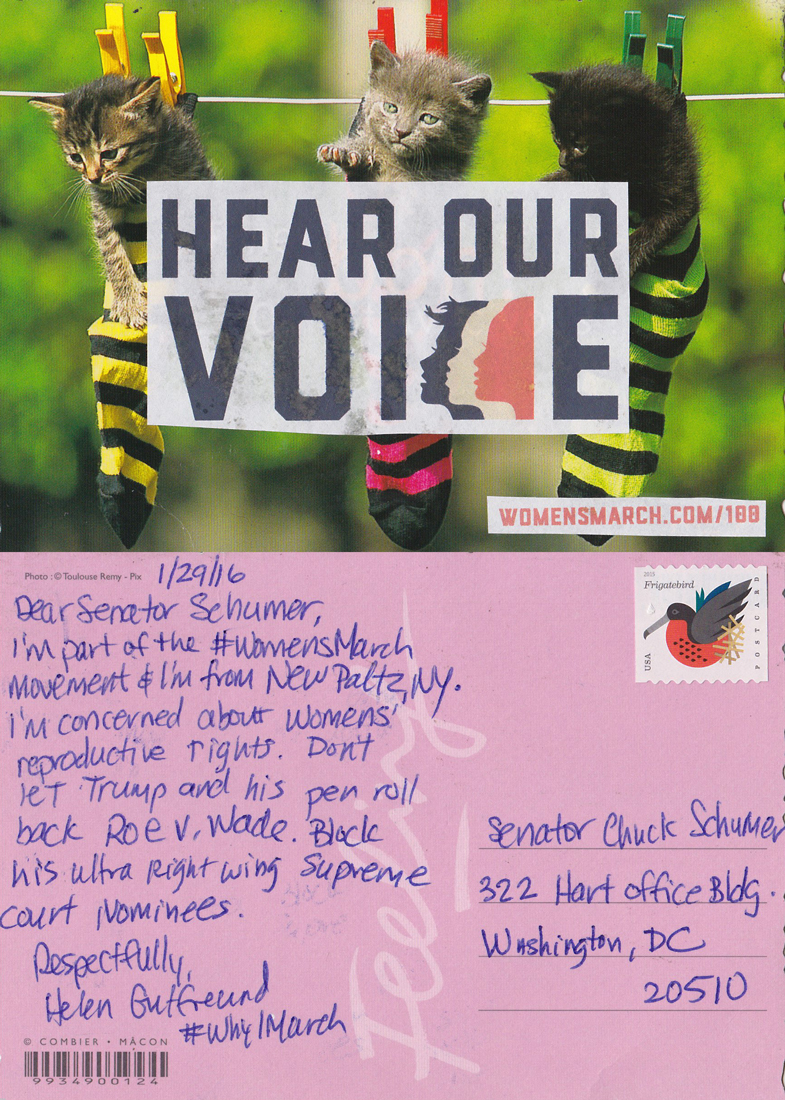
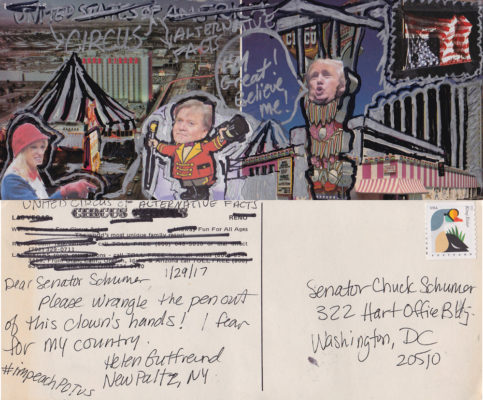
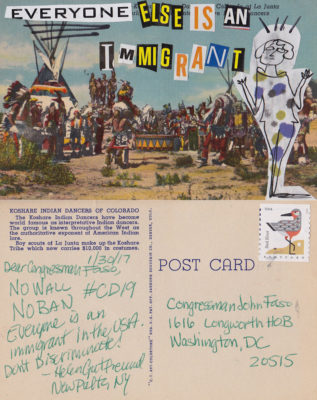
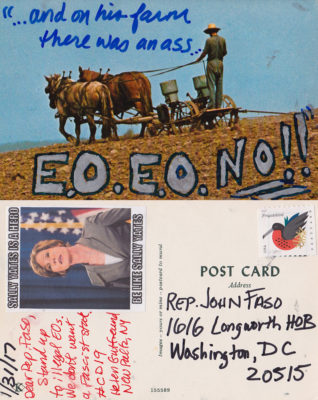
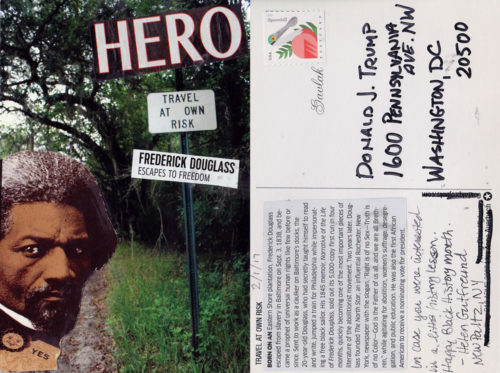
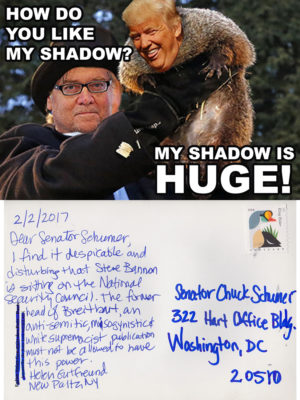
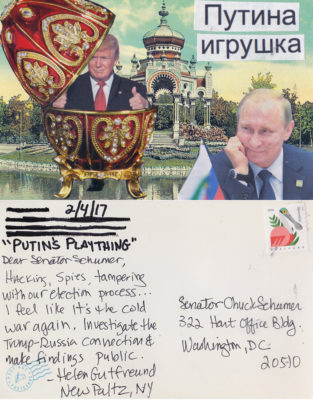
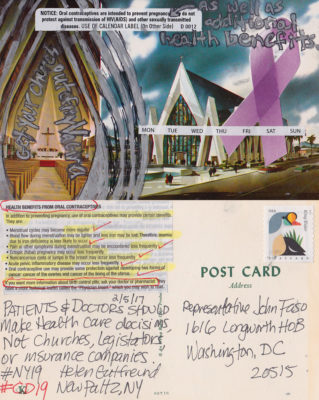
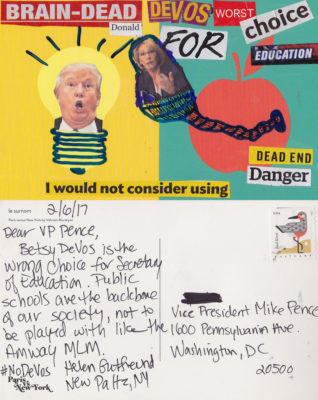









Dear Mr. President,
I’m sitting here working on yet another piece about your ties with Russia, which are, let’s face it, pretty damning. First Manafort, Stone, Cohen, Page, Flynn, now Kushner and Sessions…and then just now some guy I’ve never heard of, J.D. Gordon, said that you personally ordered the RNC to change its platform to adopt a softer stance toward Ukraine. There’s a timeline that shows this happening right after folks on your team met with the Russian ambassador.
This is not good, Mr. President. The optics on this are even worse than Kellyanne with her feet on the couch. And all we hear from you is denial after “fake news” after denial:
Jeff Sessions is an honest man. He did not say anything wrong. He could have stated his response more accurately, but it was clearly not….
— Donald J. Trump (@realDonaldTrump) March 3, 2017
…intentional. This whole narrative is a way of saving face for Democrats losing an election that everyone thought they were supposed…..
— Donald J. Trump (@realDonaldTrump) March 3, 2017
…to win. The Democrats are overplaying their hand. They lost the election, and now they have lost their grip on reality. The real story…
— Donald J. Trump (@realDonaldTrump) March 3, 2017
…is all of the illegal leaks of classified and other information. It is a total "witch hunt!"
— Donald J. Trump (@realDonaldTrump) March 3, 2017
Your supporters may be that gullible, but the rest of us are not.
And I’m tired of it. I’m tired of obsessing over Twitter. Tired of the Dworkin Report promising new evidence of wrongdoing that turns out to be something I’ve known about for weeks. Tired of figuring out new ways to convey the magnitude of what’s happening to my friends on Facebook, most of whom have probably unfollowed me.
So here’s my solution:
You, Donald Trump, President of these United States, should YOURSELF demand a special prosecutor to conduct a broad investigation of the Russia Story. Put some guy who is not affiliated with you at all, maybe even (gasp!) a Democrat, in charge. The attorney general from Washington State would be a good choice. Or Zephyr Teachout, or Laurence Tribe.
The point is, YOU have to make this happen. And here’s why:
First off, it will stop the bleeding. The press will laud your maturity, and spend weeks gushing about how this moment constituted the Great Pivot they’ve all been waiting for. The Democrats will stop harassing you. People like me will stop wondering if we should track down the father of Carter Page because he happens to live near my house, and resume writing our non-Trump-related novels. The protests may even abate a little.
Second, it will establish once and for all that there’s no fire where the smoke is. That’s what you want, right? Because even some of your supporters must be seriously wondering right now if maybe you haven’t told the complete truth here. So the investigation will be conducted, and you will escape the Russia Story once and for all, because you’re innocent, right? You’re not in cahoots with Moscow! You’re not Putin’s puppet! You just happen to genuinely dig Russia, because you dig Slavic people, which makes sense because you married two of them, and you gravitate towards people who share your Russophilia.
Seriously, think about it. How awesome would you look if you called a press conference tomorrow and said this: “The Russia Story has become a distraction, and since there is no absolutely no basis for it, I’m going to put it to bed once and for all. I’m empowering a special prosecutor to investigate the alleged Russian election meddling, and any contacts between the Kremlin and members of my campaign team, my advisers, and my business associates. I’m fully confident that I and my team will be fully exonerated. To aid the special prosecutor, I will release all of my tax returns for the last 20 years.”
The only reason not to make that announcement, in fact, is to cover up your guilt and the guilt of your associates. Me, I remain convinced that you are a treasonous criminal who sold out his country to get out of debt and/or make a few bucks. And the only way you can prove me wrong is to agree to a full investigation.
Witch hunt, you say? Fake news? Prove it, POTUS.
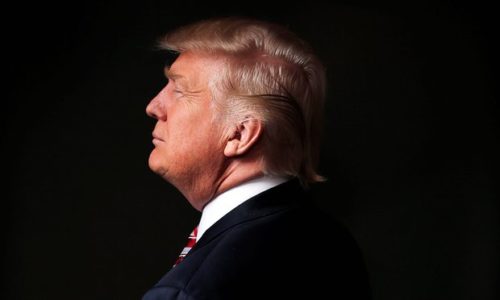
RECENTLY, the American Psychological Association issued a press release summarizing the results from a two-part study examining stress in America. Their findings indicate that two-thirds of Americans are stressed about the future of the country. Not surprisingly, stress experienced as a result of the 2016 presidential election was disproportionately experienced by Democrats (72%) versus Republicans (26%). The disparity in political leanings appears to be at odds with the shared sentiment from both sides that the future of the country is somehow off-track. Put another way, the only thing Americans agree on is that we don’t like where we’re going and we have radically different ideas of what to do to fix it.
Carroll Doherty, director of political research at Pew Research Center, writes that “political polarization is the defining feature of early 21st century American politics.” As part of his report, Doherty highlights that over the past two decades, the percentage of Americans who consistently define themselves as either liberal or conservative has doubled. So too has the level of antipathy felt by both sides toward the other. The study goes on to detail how political positions are also correlated with lifestyle preferences:
Three-quarters of consistent conservatives say they would opt to live in a community where “the houses are larger and farther apart, but schools, stores and restaurants are several miles away,” while 77% of consistent liberals prefer smaller houses closer to amenities. Nearly four times as many liberals as conservatives say it is important that their community has racial and ethnic diversity; about three times as many conservatives as liberals say it is important that many in the community share their religious faith.
Thus, whereas liberals are seeking a socioeconomically heterogenous and geographically condensed experience, conservatives desire a more religiously homogenous and isolated lifestyle, on average. However, in an increasingly isolated society, most Americans get their news, and thus have political opinions shaped, not through conversations with others, but rather by television and the internet. And many such outlets have drifted from centrist positions over time. As Dan Pfieffer described in his article “Non-Stop News” in The New Yorker, “Forty per cent of Americans…get their national and international news from cable; with the collapse of mass audiences for broadcast television, networks like Fox News and MSNBC have sought niche markets, in the process shedding all but the pretense of impartiality.”
It is well known that Fox News and MSNBC are among the most popular of extreme outlets on the political spectrum. But what objective measures exist to assess either’s impartiality?
A 2014 analysis published by Pew found that despite Fox News being very tough on then Democratic candidate Obama in 2012, MSNBC was actually tougher on Republican candidate Romney. Whereas 46% of Fox News stories on Obama were negative, 71% of MSNBC’s stories about Romney were deemed to have a non-positive tone. However, Fox News possessed the largest ideological skew, with 60% of viewers describing themselves as conservative – representing a higher percentage of viewers identifying with a political movement of any major news outlet. CNN, by contrast, had a more evenly distributed viewership (32% conservative, 30% moderates and 30% liberals). But these data were published three long years ago, before President Trump declared CNN “fake news” and the “enemy of the American People.” (Demographics for CNN viewership since the election have not been published and we are left to wonder how powerful the President’s opinion is on this topic.)
In the analysis, Pew also detailed that Fox news is more expensive, both in production costs and to the consumer, but had a higher viewership than MSNBC and CNN.
So what are viewers getting for that extra expense? Researchers at Fairleigh Dickinson University attempted to answer that question by surveying nearly 1200 people nationwideto assess how well the major news outletsaccurately educate the viewer on domestic and international affairs. Respondents were asked about what news sources they consumed the previous week and then were asked a series of questions about current political and economic events in the U.S. and abroad:
“Of course, knowledge of current events is predicted not just by watching news, but also by factors like ideology, education, age and gender,” said Dan Cassino, political scientist and poll analyst. “Based on these results, people who don’t watch any news at all are expected to answer correctly on average 1.22 of the questions about domestic politics, just by guessing or relying on existing basic knowledge.” However, the study concludes that media sources have a significant impact on the number of questions that people were able to answer correctly. The largest effect is that of Fox News: all else being equal, someone who watched only Fox News would be expected to answer just 1.04 domestic questions correctly — a figure which is significantly worse than if they had reported watching no media at all. On the other hand, if they listened only to NPR, they would be expected to answer 1.51 questions correctly; viewers of Sunday morning talk shows fare similarly well.
Results for questions about international current events were similar. People who didn’t have any reported exposure to news sources were expected to answer 1.28 questions correctly, a figure which rose to 1.97 for people just listening to NPR…and 1.52 people watching Sunday morning shows. By contrast, people who reported watching just Fox News were expected to answer just 1.08 questions correctly.
The conclusion of the study was that ideological news sources are simply echo chambers, speaking only to audiences with solitary mindsets. And with specific respect to Fox News, those using it as their onlysource of news were less accurately informed than those watching no news at all.
Thus, a large proportion of Americans simply tune in to left- and right-winged news outlets to have their opinions reinforced, rather than challenged. What results can be thought of as a positive feedback loop. For those unfamiliar with the concept of positive feedback loops, think back to high school when your principal stood up to the microphone in assembly to make an announcement. The sound of her voice resonated from the PA system, which was then picked up by the microphone again resulting in a deafening high-pitched squeal. Point being, positive feedback loops can be unpleasant, if not a little dangerous.
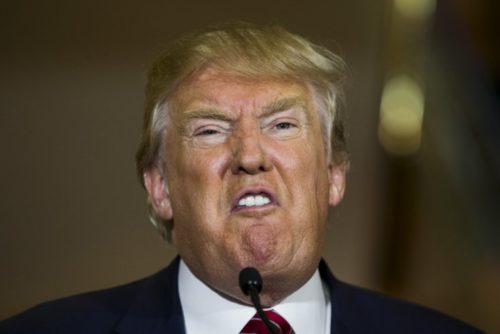
So, what happens when someone like Donald Trump enters the echo-chamber of positive feedback looping? For starters, let us assess how much of what Trump says is considered true. Based on the PolitiFact scorecard, only 4% of his statements can be labeled as factually accurate. Everything else is some shade less than that, ranging from “mostly true” to downright “Pants on Fire” lies. I contend that it doesn’t matter. I don’t mean to sound glib about this point. It should matter that our president has made a regular practice of lying to the American public. But it is not surprising. Trump has spent his life fabricating his own reality. Whomever thought he would undergo some truth-telling epiphany once he assumed the position of President was woefully naïve. Further, I submit that now Trump holds an occupation less familiar to him, the frequency of his inaccurate statements and lies will only increase.
The reason is due to something I have previously written about, called the Dunning-Kruger effect. Described by Dr. David Dunning, the effect defines what happens when one is ignorant of one’s own ignorance:
… poor performers in many social and intellectual domains seem largely unaware of just how deficient their expertise is. Their deficits leave them with a double burden—not only does their incomplete and misguided knowledge lead them to make mistakes but those exact same deficits also prevent them from recognizing when they are making mistakes…
In this fashion, Trump himself is a meta-ignorant positive feedback loop of overconfidence, painfully unaware that he is supremely ill-equipped. There are innumerable examples of Trump exhibiting the Dunning-Kruger effect now assembled in convenient YouTube compilations for reference. But what may be more significant than understanding Trump, is understanding those who unquestioningly support him. For only then can we prevent the ‘Trump’ phenomenon from happening again.
I am not speaking of Republican law makers, the group of sycophants who openly criticized and distanced themselves from Trump early on, but who now ride his train not because they trust the engineer, but rather because they like the direction the tracks are pointed. I’m speaking of the American public. Dr. Dunning discusses the impact of the effect named after him and how it relates to Americans who voted for and support Donald Trump:
In voters, lack of expertise would be lamentable but perhaps not so worrisome if people had some sense of how imperfect their civic knowledge is. If they did, they could repair it. But the Dunning-Kruger Effect suggests something different. It suggests that some voters, especially those facing significant distress in their life, might like some of what they hear from Trump, but they do not know enough to hold him accountable for the serious gaffes he makes. They fail to recognize those gaffes as missteps.
And taken a step further, if the average American does attempt to enhance their civic knowledge, but limits themselves to a single, ideological news outlet, like Fox News, the information they receive is no better than if they were to watch no news at all. In fact, it could be worse as the Trump supporter moves from listening to a feedback loop to stepping inside of one. So, what is the solution?
In 2012, Brown University researchers Steven Sloman and Philip Fernbech penned an essay addressing this very topic. In it, they discuss the “illusion of explanatory depth,” an idea explored by psychologist Frank Keil from Yale University. This concept is essentially a manifestation of the Dunning-Kruger effect which describes how most people think they understand how complex systems work even when their true understanding is only superficial. As explained by Keil, it is not until we are asked to explain the system that we realize we actually don’t know what we’re talking about. When applied to politics, Sloman and Fernbech found that people with strong views about policies that they are ignorant about become much more moderate in their opinions when asked to actually explain the policies. Thus, extreme views on political policy are tempered by a recognition that we don’t have a full understanding of the policy in question. This can apply to both us as voters, but also our elected politicians. For example, it is far easier for Trump to sign an executive order banning immigration and refugee assistance than for him to examine the issues in depth, listen to dissenting voices and recognize that it is a complex topic that requires nuance and care to appropriately address.
Asking someone to explain and argue for their understanding of a policy requires dialogue, debate and discourse, of which there is a great dearth currently in American politics. Too many news outlets would prefer to have six guest panelists scream at one another than have them calmly debate policy. But the reason they prefer to show the screaming match is because the public prefers to watch it. In our ingestion of politics from news outlets, we have become a society of moths drawn to the flame, but sadly are more attracted to fireworks which offer little substance, rather than to campfires which are a lot more useful.
Thus, the challenge for each of us is to step out of the positive feedback loops and our comfort zones. We should identify intellectuals on the other side of the spectrum and read thoughts and opinions that run counter to our own. We should challenge ourselves with a diverse and varied selection of opinions, rather than those from a solitary source. Based on all available evidence, the more educated we become, the more willing we are to admit that we have a lot yet to learn and the less extreme our opinions get.
Since the inauguration, I have written extensively on these pages about Donald Trump’s shady ties to Russia. “Dah, Donald: Russian Blood Money and the FBI’s Case Against Trump” is an in-depth look at James Comey and Moscow’s cyber warfare to influence the election. “The Trump/Russia Graft Timeline: How Do You Say Quid Pro Quo in Russian?” examines the Faustian bargain Trump struck with Putin before the election; a more complete timeline can be found here. I address more recent developments in “Moscow on the Potomac.” Finally, I recorded a podcast last week on the Trump/Russia connection.
Today’s installment is a summation of what we know so far about The Russia Story, an attempt to take all of the various articles, news reports, tweets, and so forth, and give them shape and structure.
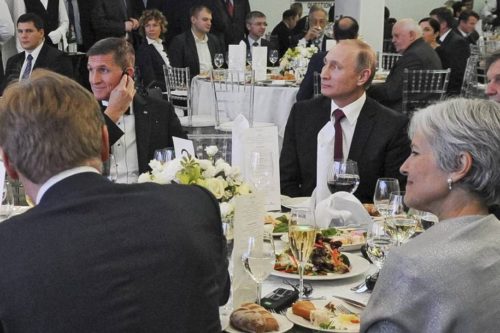
Mike Flynn, Vlad Putin, Jill Stein, at a dinner in Moscow.
DONALD TRUMP has a Russia problem.
As the national security reporter and former NSA agent John Schindler wrote on Wednesday, “Behind closed doors, plenty of American intelligence experts believe that President Trump is the pawn of the Kremlin, wittingly or not, and assess that it’s only a matter of time before unseemly Moscow ties are exposed and the White House enters unsurvivable political crisis.”
Long cozy with Russian organized crime figures, who are themselves an organ of the Federal Security Service of the Russian Federation (FSB), Trump almost certainly negotiated some sort of deal this summer with Vladimir Putin, who wanted 1) the US sanctions against Russia lifted, and 2) discord sowed among NATO allies. Both outcomes are well on their way to being realized. What Trump got out of the Faustian bargain is not yet known, but given what we learned of his execrable personality before the election, and the disgusting way he’s used the office to enrich himself since January 20, we can safely assume it involved vast sums of money.
Trump denies all of this. Thus, we can believe the Intelligence Community (IC)…or we can believe Trump and his cronies. Given the choice, I hold with the former—especially when the circumstantial evidence against Trump is so damning.
Consider:
1. Donald Trump is mobbed up, and has been for decades.
Introduced to various crime figures by his good pal Roy Cohn—one of few Americans more odious than the President himself—Trump has benefited mightily from the Mafia in his various real estate ventures. The most egregious incidents involve his use of ready-pour concrete in the construction of Trump Tower and the exploitation of illegal and underpaid Polish immigrants to demolish the Bonwit Teller building, but there is much, much more (which you can read about here or here).
The media generally ignored this rather obvious link during the campaign, preferring to focus on the horse-race and the DNC emails illegally released by Wikileaks (itself a de facto publication of Russian intelligence). This lack of wide reportage does not make the mob ties any less real.
2. The Trump Organization has extensive ties with Russian organized crime (OC), and has for decades.
Semion “The Brainy Don” Mogilevich, now 70, is the capo di tutt’i capi of the worldwide Russian mob, whom the FBI describes as the world’s most dangerous mobster. The enormous amounts of cash generated by his criminal enterprises necessitates a vast system of money laundering, unprecedented in scope and volume. Trump Org is (allegedly) one of the many organs through which Mogilevich makes legit his filthy lucre.
Back in 1992, Mogilevich dispatched Vyacheslav “Little Japanese” Ivankov, who had just completed a prison sentence in Russia, to New York, to oversee his US operation. For the next three years, Little Japanese ran amok in the United States; the FBI arrested Ivankov on June 8, 1995, and charged him with the extortion of $2.7 million from an investment advisory firm known as Summit; the following June he was convicted.
For the three years he lived in the US prior to his arrest, Ivankov resided in either Trump Tower or the Taj Mahal Casino. Both properties were owned by, mirabile dictu, Donald Trump.
Little Japanese was hardly the only Russian crime figure with a Trump address. As Schindler reports, “There are literally dozens of Russian OC scams, some gargantuan, that we know were based at Trump properties — quite a coincidence.”
This begs the question: Why do so many Russian OC figures maintain addresses at various Trump properties?
3. The Trump Organization is (allegedly) a vehicle through which Mogilevich and his Russian OC cronies launder money.
A series of reports in the Financial Times delve into the Trump Org/Russian OC relationship dating after his sixth (!) bankruptcy, when Trump’s credit at US banks was too bad to borrow more capital. Somehow Trump managed to fund several major real estate deals. How?
The human rights activist and law professor Scott Horton explains: “The money to build these projects flowed almost entirely from Russian sources. In other words, after his business crashed, Trump was floated and made to appear to operate a successful business enterprise through the infusion of hundreds in millions of cash [dollars] from dark Russian sources. He was their man.”
This was part of Russia OC’s extensive money laundering operation. Real estate is well suited for this purpose, as there is a lot of capital, a lot of money changing hands, and, as what we’ve seen of Trump’s taxes indicate, a lot of wiggle room with the IRS.
“His real estate deals were used to hide not just an infusion of capital from Russia and former Soviet states, but to launder hundreds of millions looted by oligarchs,” Horton says. “All Trump had to do was close his eyes to the source of the money, and suddenly empty apartments were going for top dollar…. real estate has an arbitrary value. Is that apartment worth $1 million? Two million? Why not $3 million for a buyer who really wants it? When the whole transaction is just one LLC with undisclosed ownership paying another LLC with undisclosed ownership, it’s even neater than hiding the money in an offshore account.”
This clears up the oft-quoted remark by Donald Trump Jr., made at a real estate conference in New York in 2008: “Russians make up a pretty disproportionate cross-section of a lot of our assets.” And: “We see a lot of money pouring in from Russia.” All Junior meant was that Russian mobsters were snapping up apartments in Trump Tower—and not for a song, either.
In short, Donald Trump’s real estate concerns, which had already gone belly-up six times, were now being underwritten by the Russian OC. What are the chances that a recidivist failure would not screw up a seventh time, and be even more in hock to Mogilevich & Co.? The Brainy Don holding it over the Not-so-brainy Don.
And just this week, Mother Jones, which has been months ahead of the Russia Story thanks to the crack work by David Corn, has reported that Trump has a “mystery creditor.” Perhaps it’s not that big of a mystery.
4. Russian OC and the Russian intelligence services are pretty much the same thing.
Vladimir Putin and Semion Mogilevich work hand in glove, with the latter’s minions performing functions too unseemly for the former’s to participate in. They are two foci of a more or less small circle of so-called oligarchs who own almost everything of value in Russia.[1. For more on the Putin/Russian OC relationship, read Karen Dawisha’s Putin’s Kleptocracy: Who Owns Russia, which discusses Putin’s involvement with the diversion of municipal funds, illegal arms shipments, the food shortage scandal of 1991, gambling, and money laundering for the Cali drug cartel.]
As a report on Global Security explains: “Belarus, Chechnya and Russia are virtual ‘mafia states’ [in which] one cannot differentiate between the activities of the government and organized crime groups….The vory v zakone”—“thieves-in-law,” in English—“do not engage in racketeering and murder, preferring to distance themselves from this activity and focus on crimes that are further up in the hierarchy, such as corruption of high-level ministers. The level of power that vory v zakone operate at is indicated by their level of interaction with these public servants, because cabinet-level officials do not spend time with unimportant people and cannot be tempted by those who do not have something important to offer.” Activities in which the vory v zakone are known to have engaged: large-scale money laundering, systematic computer hacking to rig elections, and bribery on a mammoth scale.
As for Putin, he wants to appear above board in all of these shady dealings. Which may explain the slew of recently-deceased Russians with some apparent connection to the Russia Story. Six—count ’em, six!—Russian diplomats have died mysteriously since election day, including Oleg Erovinkin, an ex-KGB general and top Rosneft executive, as well as the permanent representative to the United Nations. That number doesn’t include Mikhail Lesin, the former Russian press minister and one-time head of the Gazprom-Media Holding group, who sustained blunt force injuries to the neck, torso, arms and legs, in his room at Washington’s Dupont Circle Hotel, or the high-placed FSB cyber experts arrested for treason in Moscow.
It’s almost like Putin’s covering his tracks, no?
5. One of Trump’s business cronies is Felix Sater, a Russian-born American real estate developer with extensive ties to Russian OC.
Sater served time for a bar fight in which he attacked someone with the broken stem of a martini glass. His father is allegedly a capo in the Russian mob. So too is the Kazakh real estate developer Tevfik Arif, founder of the Blackrock Group, at which Sater served as managing director. Blackrock helped with the Trump SoHo project. You can read more about him here.
Trump has tried to walk back his relationship with Sater, once storming out of a BBC interview when the subject was pressed. He testified under oath that he would not recognize him if he was sitting next to him, and yet Trump Org issued business cards to Sater, naming him a “senior adviser to Donald Trump”:
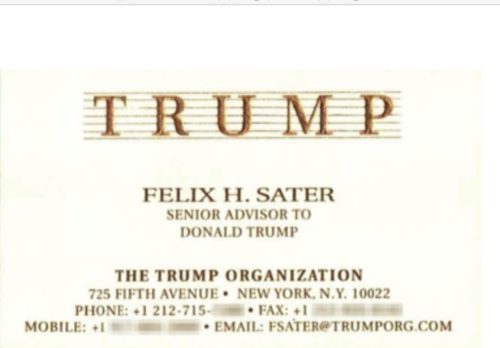
Last month, Sater met with Ukrainian opposition politician Andrey Artemenko and Donald Trump’s personal lawyer, Michael D. Cohen, at the Loews Regency in Manhattan to discuss a plan to lift sanctions against Russia. Sater gave Cohen a written proposal in a sealed envelope that was delivered to then-National Security Advisor Mike Flynn in early February. This was a meeting between a close associate of Trump’s, one with shall-we-say a chequered past and deep ties to Russian OC, to discuss lifting sanctions on Russia. And this was widely reported in the mainstream press.
Also of note: Cohen, the Trump attorney and campaign surrogate, has changed his story of what happened that day four times. Cohen is free to lie to the press as much as he likes, as he’s not under oath—everyone else in Trump’s circle does—but unless there is fire where there’s smoke, why bother?
6. The Russian OC and FSB had been cultivating Donald Trump long before the 2016 campaign…and well before his much-ballyhooed trip to Moscow in 2013.
Trump hoped that the Miss Universe event in Moscow in 2013 would enhance his ability to do real estate deals in Russia. It did not. But it did offer the object of his bromantic affections, Vladimir Putin, a chance to score some serious kompromat on Trump.
The lurid detail in the Steele dossier—you know, the tale of Donald Trump, Russian prostitutes, and golden showers—may be disinformation planted by the FSB. The dirt the Russians have on Trump from his trip to Moscow may be something completely different (Sex with minors, perhaps? Trump was alleged to have been a party to this before). But there’s little question that Putin has something on Trump from his Russian adventure.
Why else would the President continue to defend a ruthless killer like Putin, even from the White House, unless he was forced to do so…or unless that was a condition of his deal?
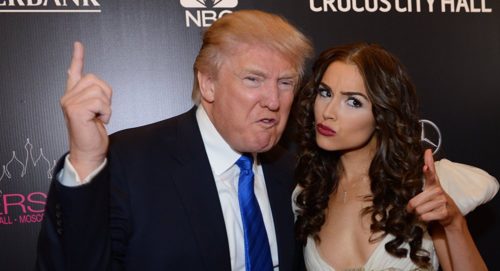
A Miss Universe contestant pretends not to be disgusted by Donald Trump in Moscow, 2013.
6. Putin wants the sanctions lifted, and he did, and will continue to do, everything in his considerable power to affect that result.
The sanctions imposed by President Obama after the Russian annexation of the Crimea hurt Putin and his cronies deeply. Hillary Clinton had no intention of lifting them. In Trump, Putin saw his best chance at the desired outcome.
The Steele dossier, which legitimacy gains steam every week, cites a July meeting in Moscow between Igor Sechin, a Putin crony who heads the oil giant Rosneft, and then-Trump foreign adviser Carter Page: “[T]he Rosneft company president was so keen to lift personal and corporate [W]estern sanctions imposed on the company that he offered PAGE/TRUMP’s associates the brokerage of up to a 19 percent (privatized) stake in Rosneft in return. PAGE had expressed interest and confirmed that were TRUMP elected US president, then sanctions on Russia would be lifted.” (Steele dossier, p. 30) This was just after a pow-wow between Felix Sater and Trump at Trump Tower for “undisclosed business” and just before the DNC leaks began.
And lo, the sale of that exact percentage of Rosneft came to pass, to a buyer the identity of which remains murky.
And lo, Trump began to lift the sanctions.
Trump’s denial was this: “I can tell you, speaking for myself, I own nothing in Russia. I have no loans in Russia. I don’t have any deals in Russia.” That doesn’t mean he already got something from Russia.
As for Carter Page, he may well not be involved in this, as he’s repeatedly claimed, but he neither looks nor sounds like an innocent man.
7. For the last two weeks, Trump has desperately tried to divert attention away from the Russia Story, using every means at his disposal to do so.
The consensus opinion of the IC is that Russia did attempt to use cyber warfare to swing the election to Trump and away from Hillary Clinton. Perhaps because this charge was levied by Clinton herself at one of the debates, it did not stick.
Only on February 9, when the Washington Post reported that nine (nine!) current and former US officials claimed that then-natsec adviser Michael Flynn did, in fact, discuss sanctions with the Russian ambassador in a series of conversations in November and December, before the inauguration, did the press begin digging into the Russia Story in earnest.
That’s when Trump went into panic mode.
First, the vicious tweets against the “fake” news organizations that dared to report on the Russia Story:
The fake news media is going crazy with their conspiracy theories and blind hatred. @MSNBC & @CNN are unwatchable. @foxandfriends is great!
— Donald J. Trump (@realDonaldTrump) February 15, 2017
The obligatory dig at Hillary Clinton:
This Russian connection non-sense is merely an attempt to cover-up the many mistakes made in Hillary Clinton's losing campaign.
— Donald J. Trump (@realDonaldTrump) February 15, 2017
A dual strike on the media and the IC:
Information is being illegally given to the failing @nytimes & @washingtonpost by the intelligence community (NSA and FBI?).Just like Russia
— Donald J. Trump (@realDonaldTrump) February 15, 2017
He’s so vehement in his contempt that Trump inadvertently admits that the classified information being leaked is legit:
The real scandal here is that classified information is illegally given out by "intelligence" like candy. Very un-American!
— Donald J. Trump (@realDonaldTrump) February 15, 2017
He demands that the Gray Lady kiss his ring (and also shows a poor understanding of the word “failing”):
Leaking, and even illegal classified leaking, has been a big problem in Washington for years. Failing @nytimes (and others) must apologize!
— Donald J. Trump (@realDonaldTrump) February 16, 2017
He invents an excuse for the press coverage of the Russia Story—the Democrats’ collective need to blame someone for their loss:
The Democrats had to come up with a story as to why they lost the election, and so badly (306), so they made up a story – RUSSIA. Fake news!
— Donald J. Trump (@realDonaldTrump) February 16, 2017
And then, in his bizarre press conference, he goes full Ibsen, with a comment designed to divert attention from the Russia Story:
The FAKE NEWS media (failing @nytimes, @NBCNews, @ABC, @CBS, @CNN) is not my enemy, it is the enemy of the American People!
— Donald J. Trump (@realDonaldTrump) February 17, 2017
Then things got really bad for Trump. First, FBI director Jim Comey convened a three-hour, super-top-secret meeting with the Senate Intelligence Committee, at which it is believed Trump’s Russia ties were discussed at length. Soon after, GOP senators began to come around on having Flynn testify before Congress:
I am now very confident Senate Intel Comm I serve on will conduct thorough bipartisan investigation of #Putin interference and influence
— Marco Rubio (@marcorubio) February 17, 2017
A few days later, Senator Susan Collins, who is on the aforementioned committee, announced she was open to subpoenaing Trump’s infamous tax returns.
This led Trump to attack the FBI, whom he idiotically thought was on his side because of the Comey letter (wrong!):
The FBI is totally unable to stop the national security "leakers" that have permeated our government for a long time. They can't even……
— Donald J. Trump (@realDonaldTrump) February 24, 2017
find the leakers within the FBI itself. Classified information is being given to media that could have a devastating effect on U.S. FIND NOW
— Donald J. Trump (@realDonaldTrump) February 24, 2017
When the oh-so-vicious tweets did not have the desired effect, he dispatched his chief of staff, Reince Priebus, to engage with the FBI and ask them to help refute the Russia story; FBI Director Jim Comey, predictably, refused. The thing is, what Priebus did is patently not legal. Furthermore, if Trump wanted the FBI to refute the story by releasing the evidence, he could simply declassify that evidence himself. He also could release his taxes to back up his claims of having no debt to the Russians. So, um, why won’t he?
The same day the Priebus/FBI story broke, Trump banned several media companies from the White House briefing room—which is, as I’m not the first to point out, a Fascist move. Notably, the outfits he banned were…wait for it…the very ones that were most doggedly pursuing the Russia Story!
~
The full Russia Story has not yet been revealed. Certain key chapters have been redacted. More information needs to come to light.
But the most rational explanation for Trump’s refusal to release his taxes or speak a discouraging word about Putin, his ability to bounce back in real estate after all those bankruptcies, his out-of-nowhere victory in the election, and, for that matter, his fascination with cheap Eastern European labor, whether it be Polish demolition workers, Romanian Mar-a-Lago waiters, or Slovenian wives, is that he’s in deep with the Russians.
The President of the United States has either made an illegal deal with Putin, or he’s being blackmailed, or he’s a “useful idiot” whom Moscow is manipulating, or he’s all three in some combination. There is simply no other explanation for what has transpired.
This is not “fake news.”
This is not “conspiracy theory.”
This is the greatest scandal in the history of the American presidency.
A CENTURY AND A HALF of distance has worn away the rough edges, and the Civil War, for most of us, is now understood as Lincoln’s heroic battle to free the slaves. But make no mistake: the Civil War is far and away the worst crisis in the history of the United States. Some 620,000 Americans perished during the four years of the conflict, some two percent of the population—more casualties than were seen in every American war from the Revolution through Korea. The bloody savagery on the battlefields of Shiloh, Antietam, Stones River, and Gettysburg had never been witnessed before, anywhere, in the long annals of human warfare. And while the Northern aims of the war were accomplished—the slaves were technically freed and the Union was technically preserved—the Reconstruction period was so badly bungled that the scars have never fully healed.
Slavery may have been the engine that fueled the Civil War, but it began not with an executive order by Lincoln to free the slaves—that would come later—but with the Southern states seceding from the Union to form the Confederacy. A secession crisis led to 620,000 people dying. This is important to bear in mind, because there has been talk of California taking a page from the South Carolina playbook, seceding from the Union, and forming its own country. A group called Yes California is working to secure enough signatures to put secession on the state ballot there, and propositions on ballots in California have a way of being unpredictable.
Abraham Lincoln was resolute in his belief that the Union, above all, must be preserved. Was he right? One could make the argument, certainly in hindsight, that a fracture into two countries was less horrible than what took place, that slavery would have died out on its own, that allowing the South to come to its own conclusions about that odious practice would have erased 150 years of Dixie resentment toward the Yankees, and so on. But Lincoln did not entertain this view, and was willing to make enormous sacrifices, including his own life, to keep one nation indivisible.
Fast forward to 2017: What happens if California votes to secede? Would President Trump cling to his as-yet-undiscovered principles and force the Golden State to remain, risking a second Civil War in the process? Or would he take the easier route and allow it to leave, knowing that, as he’s mentioned before, he would have easily won the popular vote, too, if not for all the Hillary voters on the Left Coast? As appealing as a nation of California might be—or, be still my heart, a “Blue-topia” nation of California, Oregon, Washington, New York, New Jersey, Connecticut, Massachusetts, Vermont, New Hampshire, Maine, Rhode Island, Delaware, and Maryland—neither of these options makes democracy stronger, not with an increasingly autocratic Trumplandia occupying the bulk of the country’s real estate. A splintered United States is, in fact, Vladimir Putin’s wildest dream (and likely Steve Bannon’s as well).
Indeed, a closer look at the Yes California movement reveals plenty of Russian fingerprints. Both of its founders, Marcus Ruiz Evans and Louis Martinelli, are conservatives and have registered as Republicans. Evans lives in Fresno; Martinelli, in—wait for it—Yekaterinburg, Russia, site of the Bolshevik massacre of the Romanov royal family. And while the latter’s choice of residence may be perfectly benign, I’m not the first to raise an eyebrow at the coincidence. As Katie Zezima reports in the Washington Post:
But Yes California has had to fend off a torrent of questions about Russian influence. In September, Marinelli represented the group at a Moscow conference hosted by the Anti-Globalization Movement of Russia; 30 percent of conference funding came from the Russian government, but none went to Yes California, according to its organizer. Yes California opened a “cultural center” at the movement’s Moscow headquarters in December. Marinelli has compared California independence to the annexation of Crimea, and Yes California has received a flurry of news coverage from the government-funded RT.
Zezima goes on to quote Martinelli’s denial of official Russian involvement: “We don’t have any communication with or contact with or receive any support of any kind from the Russian government or any Russian government officials.” This may be perfectly true, but it sounds a lot like denials of Russian influence made by Carter Page, Paul Manafort, and Donald Trump himself. And I’m quite certain that Trump is lying.
An independent California would be akin to the collapse of the Soviet Union: a huge win for Moscow. Think about the chaos CALEXIT would cause. It would make BREXIT look like a flawless Argentine tango on Dancing with the Stars. What would California do for currency? For a military? How would the government function? What about immigration? Could the rest of us move there? And what would the response be from President Trump? Would it be an excuse to impose martial law on the rest of the country? WOuld he have to build a wall in Nevada, too?
Why would Putin not want that outcome?
In a speech two years before the Civil War, Lincoln famously remarked that a house divided against itself cannot stand. He went on: “I believe this government cannot endure, permanently, half slave and half free. I do not expect the Union to be dissolved — I do not expect the house to fall — but I do expect it will cease to be divided. It will become all one thing or all the other. Either the opponents of slavery will arrest the further spread of it, and place it where the public mind shall rest in the belief that it is in the course of ultimate extinction; or its advocates will push it forward, till it shall become lawful in all the States.”
We are at a similar moment of seemingly irreconcilable division. Lincoln might just as well have been speaking of Trump and the rise of the crony capitalist autocracy. Honest Abe, our greatest leader, foretelling our worst president and most egregious liar. American carnage, indeed.
If part of your house is infested with rats, you don’t move, and you certainly don’t stop using that part of the house. What you do is get rid of the rats.
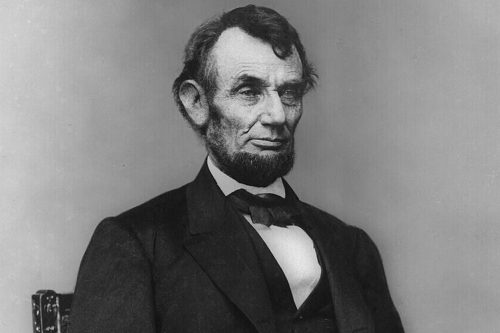
BETWEEN THE COURT RULINGS subsequent to the roll-out of President Trump’s hare-brained Muslim ban, the confirmation battles for Betsy DeVos and Jeff Sessions, and the increasingly deranged remarks spewing from Trump’s two Twitter accounts, domestic affairs have for good reason dominated the headlines since Trump took office in January. None of the troubles roiling the homeland change the fact that the first three weeks of Trump’s presidency could not have gone more smoothly for Russian president Vladimir Putin.
Russian aggression in eastern Ukraine has gone not only unchecked, but almost un-remarked upon in the US press. Rex Tillerson, who received the prestigious Order of Friendship medal from Putin himself while CEO of Exxon, was confirmed as Secretary of State with minimal fuss, while Michael Flynn, whose illicit if not outright treasonous ties to Moscow have long been rumored, is Trump’s national security adviser. And the prize Putin has sought is now in plain sight: Trump has already lifted some of the sanctions on Russia. Surely it is only a matter of time before they are lifted entirely.
This is especially troubling because Trump, whose capacity for outrage seems to know no bounds, remains curiously unwilling to disparage Putin. In his pre-Super Bowl interview with Bill O’Reilly, Trump swatted away the suggestion that Putin was a killer. “We’ve got a lot of killers,” Trump told O’Reilly. “Boy, you think our country’s so innocent? You think our country’s so innocent?” Adopting the “America is the root of all evil” position of the Jill Stein/radical left crowd was perhaps ironic, given the radical rightwing nature of much of Trump’s policies. But make no mistake: this comment was clearly intended to minimize Putin’s penchant for murder—and to paint the Russian president in the best possible light.
Why is Trump, a bully whose diplomatic instincts are practically non-existent, so deferential to Putin—and only to Putin? Given what he know of Trump’s ego-centered personality, the most likely explanation is that the Russian president is somehow blackmailing him.[1. My own theory is that Putin forgave a nine-figure debt to a Russian bank in exchange for the sanctions being lifted. Read about it here.] This is not some crazy conspiracy theory, insofar as the US intelligence community also believes that Trump is being blackmailed.
Think about that for a moment. Let it sink in. The President of the United States has been compromised by the Russians. Whatever your politics, this is not something to be shrugged off. The Trump/Russia ties need to be investigated, and not just by James Comey at the FBI.
The past three weeks have done little to assuage suspicions. To the contrary, February has played out exactly as Putin would have wanted. To wit:
Ukraine/Crimea
Lost in the sea of Donald Trump’s all-cap tweets, Russian forces have been bombarding eastern Ukraine. Yesterday, Newsweek syndicated an analysis of the situation by two Ukrainian experts, with the lurid if misleading headline “PUTIN TO TRUMP: LIFT SANCTIONS OR UKRAINE GETS IT.” One gander at the map explains Putin’s ambitions in the region:
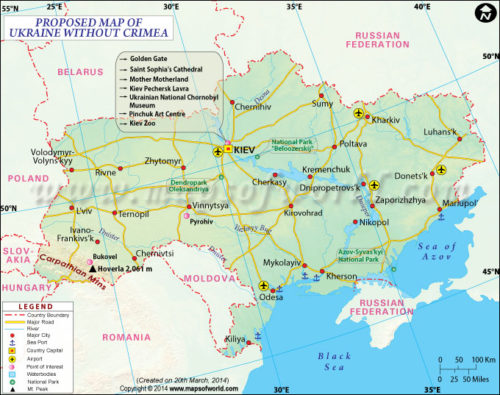
He wants territory along the Sea of Azov, to better connect the occupied peninsula with the Russian mainland. The city of Mariupol is especially significant. Now that Putin has moved troops into the region, he might agree not to invade the rest of Ukraine—which he has no interest in doing regardless—if he gets to keep the eastern strip and the Crimea and the US lifts the sanctions. This way, Putin gets what he wants, and Trump is seen to have “stopped” Putin.
Favorable Appointments
Carter Page, one of Trump’s foreign policy advisers until he suddenly wasn’t, is now said to be in the running for ambassador to Russia (by the Moscow Times, no less!). Page is a key figure in the Steele dossier, the series of intelligence reports filed in the summer and fall of 2016 by British operative Christopher Steele concerning Trump’s ties to Russia, and his sudden ouster from Trump’s inner circle is thought to be because of his questionable ties to Rosneft, the Russian oil giant. But Page was in the know enough to announce, at a December lecture in Moscow, that Rex Tillerson would be named Secretary of State…before Trump had informed the American people. The contents of his lecture made it very clear where his sympathies lie (hint: Moscow).
Heatstreet’s Louise Mensch—who has been prescient on the Trump/Russia ties for months now—reports that Page was recommended to the Trump team by none other than Jeff Sessions, the newly-minted Attorney General. In his new role, Sessions has the ability to release the Russian hacker Ygeveny Nikulin, now in custody in Prague, and to scuttle any Russia/Trump investigation. His racist background and staunch Trumpist views, in line with Putin’s own, will furthermore serve to direct popular attention away from Russian influence.
While CEO of Exxon, Rex Tillerson orchestrated an oil drilling deal with Russia that was scuttled because of the sanctions. Per Forbes: “Exxon has a $720 million joint venture with Rosneft, run by Putin’s friend Igor Sechin. That deal has been put on ice since the White House sanctioned Russian oil and gas companies in July 2014.” Could Putin have asked for anyone better to head the State Department than the corporate giant with whom his friend made that deal?
This does not even take into account yesterday’s other bit of news: Michael Flynn, Trump’s national security adviser, lied about the nature of his conversations with the Russia’s US ambassador prior to Trump’s inauguration. Sactions were discussed, even as both Flynn and Vice President Mike Pence vehemently denied this at the time. This is a violation of the Logan Act. But it also underscores just how much sway Putin has over Trump’s inner circle.
Sanctions Lifted
A few days after the historical call between Trump and Putin—some of which, astonishingly, not recorded!—Trump began to lift sanctions on Russia. The first round of sanction-lifting went down on February 2, with restrictions eased on Russian intelligence agency FSB. The FSB, it should be noted, are the very people responsible for the cyber warfare that compromised the US election. Wholesale elimination of sanctions cannot be far behind.
~
Whether or not Trump is being blackmailed—and, again, the US intelligence community believes this to be the case!—his behavior towards Putin has been odd, especially for one as full of bluster as the president. And the results are unequivocally favorable towards Russia. Put another way: why else would Trump be so deferential towards Putin, if not for blackmail?
We must be vigilant in reporting this story, we must demand further investigations into the Russia/Trump ties, and we must, if Trump is proven guilty of collusion with Putin, impeach him immediately. Treason has no political party.
~
UPDATE, 13 February: Michael Flynn has resigned, upon revelations that he “misled” the president and vice president about the nature of his communications with the Russian ambassador. Russian lawmakers rush to his defense. No US ones do.
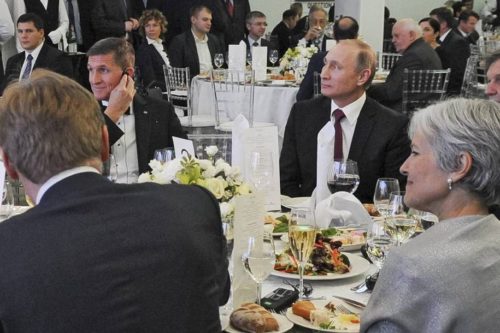
Michael Flynn, Vladimir Putin, and Jill Stein at a dinner party in Moscow.